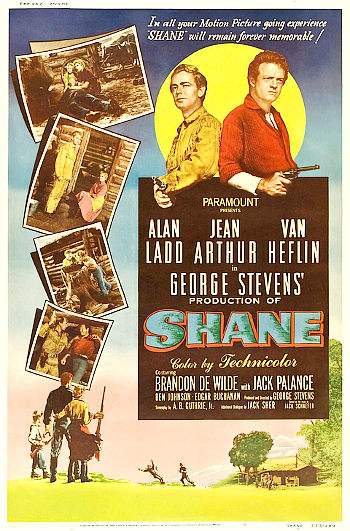 Alan Ladd is Shane, the mysterious, six-gun wielding stranger who rides into a valley where Joe Starrett (Van Heflin) and a handful of other men are trying to carve out homesteads.
Alan Ladd is Shane, the mysterious, six-gun wielding stranger who rides into a valley where Joe Starrett (Van Heflin) and a handful of other men are trying to carve out homesteads.
They’re doing that to the consternation of Rufus Ryker (Emile Meyer). He helped settle this part of the West and thinks he needs all the land to raise his cattle.
He and his men are trying to intimidate the homesteaders into moving out; Joe Starrett is helping to hold them together, convincing one after another not to give up the dream of their own farm on their own land.
His wife Marian (Jean Arthur) and son Joey (Brandon De Wilde) make him cling to that dream. The arrival of Shane is welcomed by all three, though Marian’s a little concerned by his skill with a gun.
Meanwhile, Ryker has just landed a new beef contract. And when killing animals, tromping crops and setting fire to cabins doesn’t rout the homesteaders, he sends to Cheynne for a gunslinger named Wilson (Jack Palance).
Ryker wants a showdown with Starrett.
He winds up prompting a showdown with Shane.
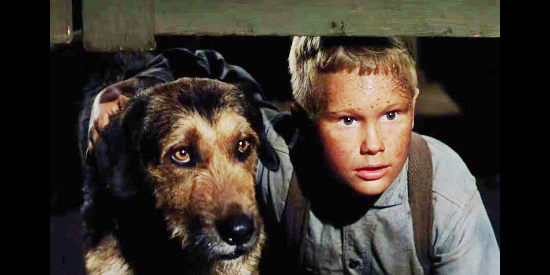
Brandon DeWilde as Joey Starrett, watches a showdown from under the doors of the saloon in Shane (1953)
Deservedly hailed as one of the great Westerns, director George Stevens brings a realism to the West you won’t find in many other Westerns of the 1950s.
The barroom brawl, the hilltop funeral, the gunfight between homesteader Stonewall Torrey and Wilson — they’re all staged much better than we’d come to expect from Hollywood.
And the fact that Stevens brings much of it to us from the perspective of Starrett’s young son Joey, who so quickly comes to admire Shane, is a brilliant touch.
Of course, a superlative cast helps too. Ladd turns in his finest Western peformance as the quiet, but oh-so-tough stranger. Heflin is as solid as always. Jean Arthur makes a much more convincing pioneer wife than the glamour queens who usually inhabited Hollywood homesteads.
This marked Arthur’s final film; in fact, Stevens lured her out of retirement to take the role of Marian Starrett. Conversely, this marked one of the earliest roles for De Wilde and for Palance, who’d later find a home in the genre overseas.
“Shane” and its cast members wound up being nominated for six Academy Awards, including best picture, best director and best supporting actor (both De Wilde and Palance). It wound up winning one, for best cinematography.
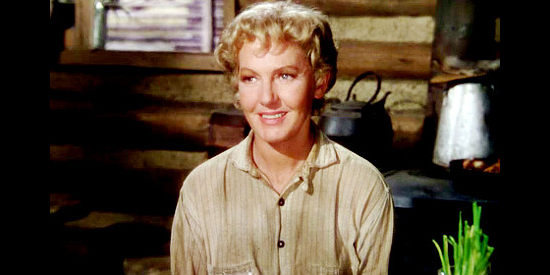
Jean Arthur as Marian Starrett, Joe’s wife, opposed to violence and fearful for her husband’s safety in Shane (1953)
Directed by:
George Stevens
Cast:
Alan Ladd … Shane
Jean Arthur … Marian Starrett
Van Heflin … Joe Starrett
Brandon De Wilde … Joey Starrett
Jack Palance … Jack Wilson
Ben Johnson … Chris Calloway
Edgar Buchanan … Fred Lewis
Janice Carroll … Susan Lewis
Helen Brown … Martha Lewis
Emile Meyer … Rufus Ryker
John Dierkes … Morgan Ryker
Elisha Cook Jr. … Stonewell Torrey
Douglas Spencer … Axel “Swede” Shipstead
Edith Evanson … Mrs. Shipstead
Ellen Corby … Mrs. Liz Torrey
Paul McVey … Sam Grafton
John Miller … Will Atkey
Leonard Strone … Ernie Wright
Ray Spiker … Axel Johnson
Martin Mason … Ed Howells
Nancy Kulp … Mrs. Howells
Runtime: 118 min.
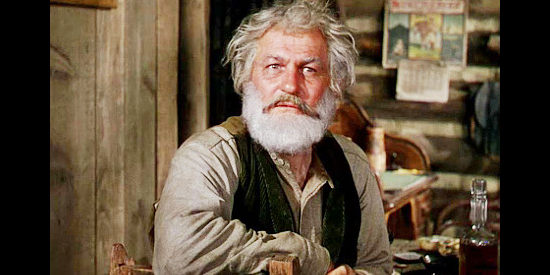
Emile Meyer as Rufus Ryker, determined to push the homesteaders off land he considers his in Shane (1953)
Memorable lines:
Shane, after Joe Starrett mistakes him for a Ryker man: “Mind putting down that gun. Then I’ll leave.”
Joe Starrett: “What difference does it make? You’re leaving anyway.”
Shane: “I’d like it to be my idea.”
Joe Starrett: “That land over there is Ryker’s. He thinks the whole world belongs to him.”
Joe Starrett: “Sometimes there ain’t nothin’ that will do but your own sweat and muscle.”
Ernie Wright, as homesteaders plan to hold a meeting to talk about the Rykers: “If we’re going to have a meeting, it better come to more than just poking holes in the air with your finger.”
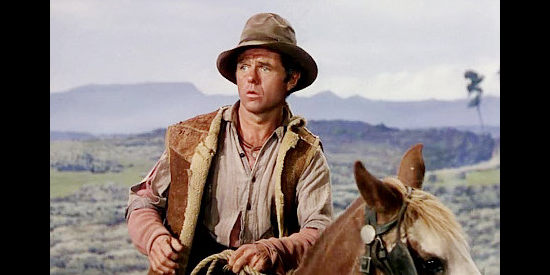
Elisha Cook Jr. as Stonewall Torrey, the southern vet determined to show how brave he is in Shane (1953)
Rufus Ryker: “From now on, when we fight with them, the air is going to be filled with gunsmoke.”
Marian Starrett: “Guns aren’t going to be my boy’s life.”
Shane: “A gun is a tool, Marian. No better or no worse than any other tool — an axe, a shovel or anything. A gun is as good or as bad as the man using it. Remember that.”
Marian: “We’d all be better off if there wasn’t a single gun in this valley. Including yours.”
Rufus Ryker: “I like Starrett, too. But I’ll kill him if I have to. I tell you, I’ll kill him if I have to.”
Wilson: “You mean I’ll kill him if you have to.”
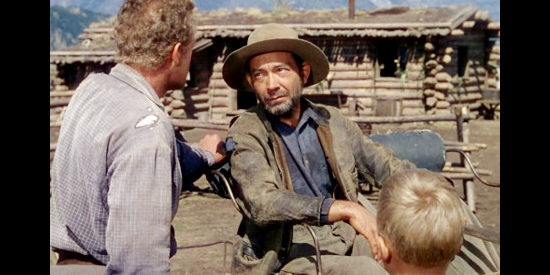
Leonard Strone as Ernie Wright, a homesteader forever threatening to leave the valley in Shane (1953)
Joe Starrett: “God didn’t make up all this country just for one man like Ryker.”
Fred Lewis: “He’s got it though. And that’s what counts.”
Shane: “You’ve lived too long. Your kind of days are over.”
Rufus Ryker: “My days? What about yours, gunfighter?”
Shane: “The difference is I know it.”
Rufus Ryker: “All right. So we’ll all turn in our six-guns to the bartender. We’ll all start hoeing spuds. Is that it?”
Shane: “Not quite yet.”
Shane: “Joey, there’s no living with… with a killing. There’s no going back from one. Right or wrong, it’s a brand. A brand sticks. There’s no going back. Now you run on home to your mother, and tell her… tell her everything’s all right. And there aren’t any more guns in the valley.”
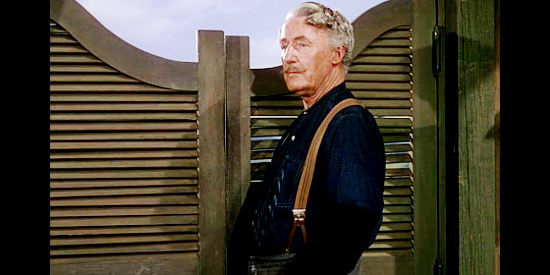
Paul McVey as Sam Grafton, owner of the general store and saloon where the ranchers and homesteaders clash in Shane (1953)
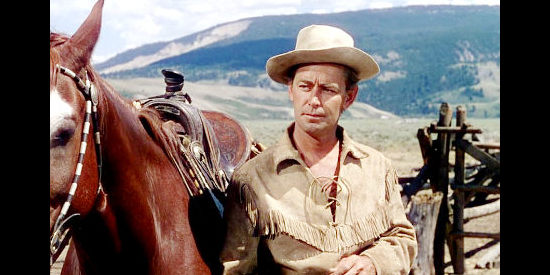
Alan Ladd as Shane, riding into the valley and right into a war between ranches and homesteaders in Shane (1953)
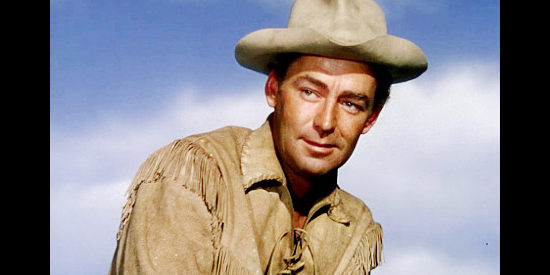

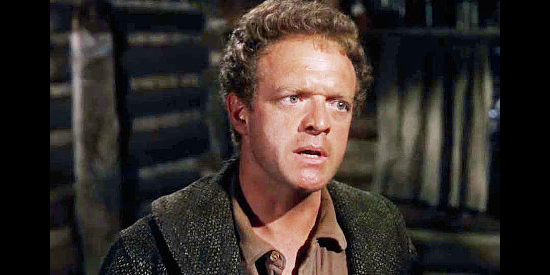
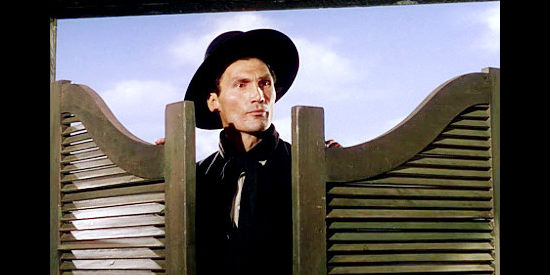
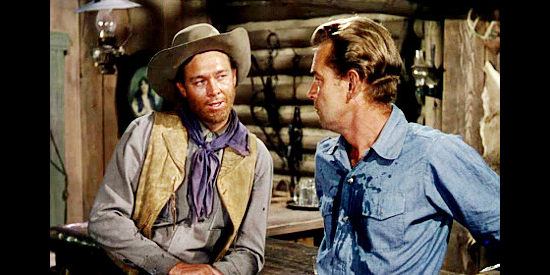
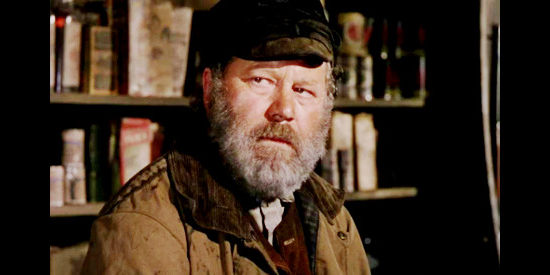
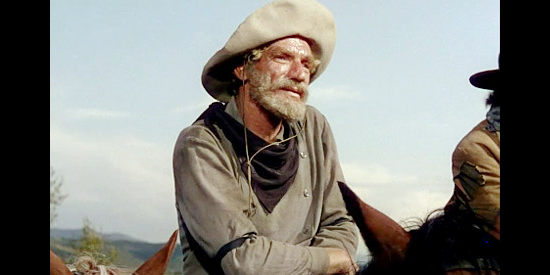
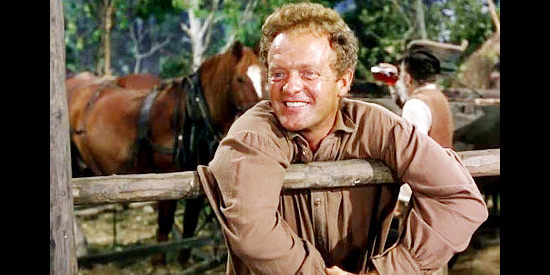
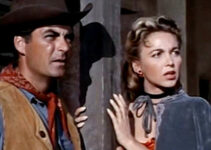
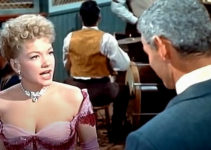
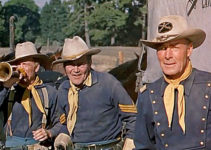
This film is a Diamond amongst the pebbles of 50’s westerns. It’s a true classic and even though it didn’t have the level of violence or gunplay I normally prefer it drew me in and kept me interested in the characters from start to finish. This is a straightforward good vs. evil tale told with excellent performances against the picturesque vistas of this beautiful country. Alan Ladd and Van Heflin both excel as Mens Men cut from different cloth who form an instant bond thru mutual respect that never waivers-even as they beat the hell out of each other. Jean Arthur is strong as a woman committed and true to her husband but whom cant help but be attracted to the handsome gunfighter who arrives unannounced. She looks great-hard to beleve she was 60 when this film was made. Emile Meyer leads a mean group of cow pokes who have no use or room for homesteader’s on land he deems his by imminent domain-fences impede cattle. Ben Johnson shines with a quiet cool as a bully who eventually realizes he’s been on the wrong side of things and has had enough. Jack Palance is the hired gun- a silent menace in this early role for him-you truly realize the level of his lack of conscience as he laughs repeatedly during the funeral of a homesteader he deliberately goaded into a gunfight. For me the weak performance was the child actor Brandon DeWilde-his delivery was redundant and felt perhaps too child like-this film ain’t Peter Pan. I cant believe he was nominated for an academy award-must have been a slow year. The final showdown is quick-just the same way a life can be snuffed out-in the blink of an eye and the twitch of a finger. Wow-what a film.
Spoiler Alert: there has been much discussion and debate for over 70 years about whether Shane lives or dies to me it seems clear- after the gunfight as he’s leaving town he tells the child to reassure his mother “there are no more gunfighters in the valley”. He departs at dusk, slumping sideways in his saddle and is going thru a cemetary in the mountains-not the one on the prairie in town but perhaps boot hill ?
Thanks for saving the homesteaders with one last gun battle Shane and R.I.P.
PS-Another really good (except the very end was hollywood cheesy) but entirely different western starring Alan Ladd is ONE FOOT IN HELL. Didnt even realize it was same actor at first-hard to believe he had only aged 7 years since Shane. Alcohol and pills had taken their toll and he died too young. R.I.P. Alan Ladd
Shane, more than any Western I’ve seen, is a slow burn that, in its final act, packs an immense emotional wallop. The first two thirds of Shane are languid, idyllic and a bit charming, but don’t necessarily foretell its incredibly intense climax.
Joe Starrett (Van Heflin), Marian Starrett (Jean Arthur) and young Joey Starrett (Brandon De Wilde) are homesteaders on the stark Wyoming landscape. Life isn’t easy for them, but they actually appear to be doing reasonably well. Enough so that the family feels profound attachment to their homestead, and, like a huge stump on the land, stubbornly refuse to yield, even to the threat of violence from a gang of ranchers led by Rufus Ryker (Emile Meyer). The conflict with the ranchers is the lone circumstance denying the Starretts true contentment and peace of mind.
Enter Shane (Alan Ladd), a taciturn drifter with the air of a gunman, who happens upon the Starretts, is invited into their midst, and ultimately joins the side of the homesteaders against the ranchers. Shane and Joey form an immediate bond, and it is Joey’s adulation of Shane that powers the cyclonic emotionalism of the film’s conclusion. Suffice it to say there will be a reckoning between the warring groups, and a gut-wrenching valedictory with Joey and a wounded (mortally?) Shane.
The picture’s key moment is the intrusion of evil in the form of gunman Jack Wilson (Jack Palance) who provokes a pugnacious homesteader, Stonewall Torrey–played by Elisha Cook–to his death in an unequal gunfight. At this point Shane transitions from a leisurely, bucolic spat into a genuine clash between good and evil on a flyspeck on the American frontier.
Torrey’s funeral, pitched on the forbidding landscape, is mournful and truly moving. Torrey’s dog–and animals play a huge role in this film as emotional barometers–joins in the mourning as his master is lowered into the ground. Off in the distance, Jack Wilson chuckles with mirth. Evil incarnate.
Naturally, matters escalate quickly from there. Joe Starrett intends to confront Ryker and his gang over Torrey’s murder. Shane, understanding Joe would surely die in the doing, fights him, ultimately knocking him cold with his gun. Shane assumes Joe’s place and his mission, which is to decimate the Ryker gang and allow the homesteaders to live in peace.
The fight between Joe and Shane, incidentally, is a masterpiece in itself. It’s a brutal, knockdown-dragout affair with a man’s (Joe’s) life hanging in the balance, and the farm animals seem to have some comprehension of what is happening, for they bawl, bray, bellow and attempt to break out of the corrals.
After prevailing, Shane ventures into town and does what he must do. Unbeknownst to him, Joey and his dog trail after him and witness the succeeding gun battle. Joey then reveals his presence to Shane, they say an agonizing goodbye and Shane rides into the sunset. Finis.
This is an emotionally powerful film and watching it is a wringing experience. De Wilde and Arthur, the picture’s pivots of pathos, turn in particularly fine performances. Meyer as Ryker and the marvelous Ben Johnson as Ryker henchman-turned-good guy Chris Calloway, are also excellent.
Shane is widely regarded as quite possibly the greatest Western ever made. Opinions will vary, of course, and a strong case can be made for several other Westerns. However, what cannot be denied is Shane’s prominent place in the great Western pantheon. As long as people watch films, it will remain there.